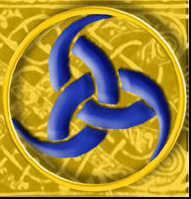
Terms of
Use
Submissions
~ Historical & Classical Poetry ~
Runic Odes from the Norse Tongue
ODE I.
The Twilight of the Gods, or, The Destruction of the World
From the chambers of the East,
In robes of terror grimly drest,
Ymir hath his course begun,
Rival of th' unwearied Sun.
Now, in many a glist'ring wreath,
Above, around, and underneath,
The serpent dread, of dateless birth,
Girds the devoted globe of earth ;
And, as charm'd'by pow'rful spell,
Ocean heaves with furious swell.
The plumed Monarch whets his beak,
Seeking where his wrath to wreak;
Till on the plain, with corses strew'd,
He sates his maw with bleeding food:
While the vessel's floating pride
Stems duration's rounding tide.
Trace again the solemn rhyme ;
From Orient's ever-teeming clime
I see them come, an evil race,
Bold in heart, and stern in face:
In turbulent array they sweep,
Beneath them groans the burthen'd deep;
Fierce they rush, yet all obey
Monarch Lok's resistless sway.
Gaunt and wild with savage howl,
Mark the wolfish Fenris prowl;
With him stalks a furious train,
Panting for th' ensanguin'd plain:
Is Beliep's brother left behind ?
No: he flies on wings of wind.
Know'st thou what is done above?
No more in halls of joy and love,
The favour'd guests, profuse of soul,
Drain the skull or nectar'd bowl:
What Genii shake that nodding frame?
These are deeds without a name.
Struck with elemental jar,
Gods themselves come forth to war:
From the many-mansion'd dome,
Giant-tenants loosen'd roam,
The dwarfish guardians of each cell
Shriek around with fearful yell:
Declare what uncontrolled pow'r
Presiding rules the mortal hour:
These no acts of joy and love--
Know'st thou now what's done above?
From the regions
of the South
Surtur bursts with fiery mouth:
High o'er yonder black'ning shade
Gleams the hallow'd sun-bright blade,
Which in star-bespangled field,
Warrior Gods encount'ring wield.
From Vengeance' red celeftial store
Ministers of ruin pour ;
Caverns yawning, mountains rending :
Confcious of the fate impending,
Ydrasil's prophetic ash
Nods to the air with fudden crash:
Monstrous female forms advance,
Stride the fleed, and couch the lance:
Armed heroes throng the plain,
Harbingers of Hela's s reign;
And see, from either verge of Heav'n,
That concave vast afunder riv'n.
Why does beauteous Lina weep ?
Whence those lorn notes in accent deep ?
A day of war! prepare, prepare:
in distant realms of air,
Mark the murd'rous monster stalk
In printless majesty of walk.
Odin fearless meets the shock,
While Heav'n's high tow'rs around him rock ;
Though arm'd in panoply divine,
He yields, and owns the fated sign ;
To the mansions drear he turns
In vain the beauteous Lina mourns.
Glowing with paternal fire,
Generous rage and fierce desire,
See Odin's offspring, Vidar bold,
His sanguine course unfault'ring hold.
In vain 'gainst him in fell accord
Giant forms uplift the sword;
He locks his foe in iron sleep,
And stamps the filial vengeance deep.
Think not yet the measure full,
Or the sword with carnage dull ;
Lodina's glory, heart and hand,
Joins the fight and takes his stand.
Lo! in many a horrid turn,
Crest that gliftens, eyes that burn,
The lordly serpent rolls along,
Nor fears the brave, nor heeds the strong:
But hark, 'twas Fate in thunder spoke;
Vidar deals the daring stroke,
Lays the death-doom'd monster low,
And triumphs o'er his burnish'd foe.
From the cavern deep and dank,
Bonds that burft, and chains that clank.
Proclaim the griefly form canine
Loosen'd from his long confine:
Garmar foams with rage and shame;
Garmar, to gods no fearless name.
Signs abroad portentous low'r;
'Tis Desolation's fatal hour:
Fiery shapes the aether wing;
Surtur calls; they know their king.
Dark encircling clouds absorb
The lustre of light's central orb;
Conscious stars no more dispense
Their gently beaming influence,
But bursting from their shaken sphere,
Unsubstantial disappear.
No more this pensile mundane ball
Rolls through the wide aëreal hall;
Ingulphed sinks the vast machine.
Who shall say, THE THINGS HAVE BEEN !
Thomas James Mathias (1754?-1835)